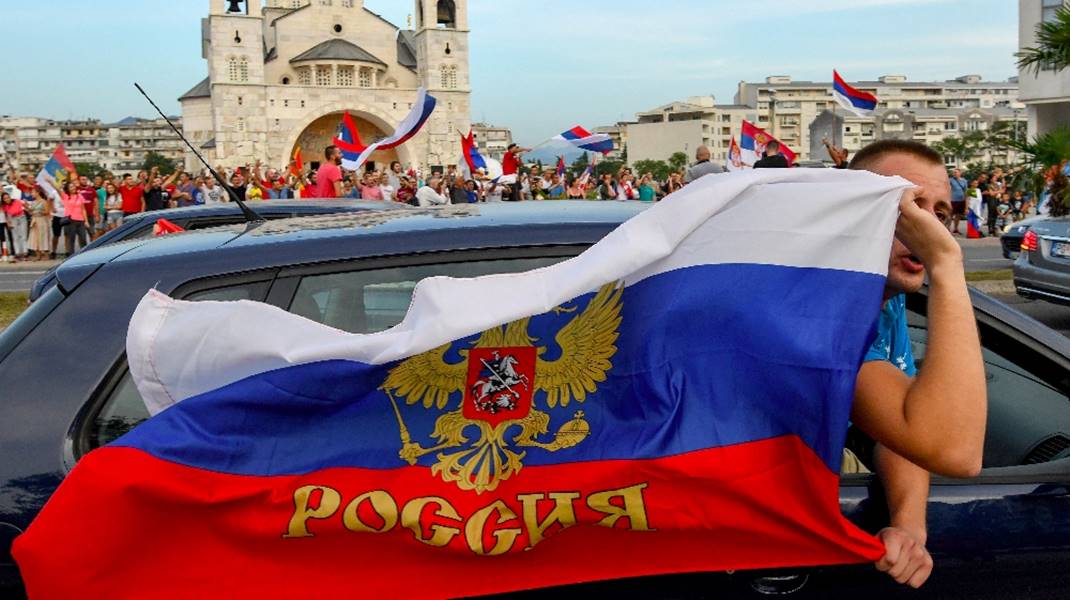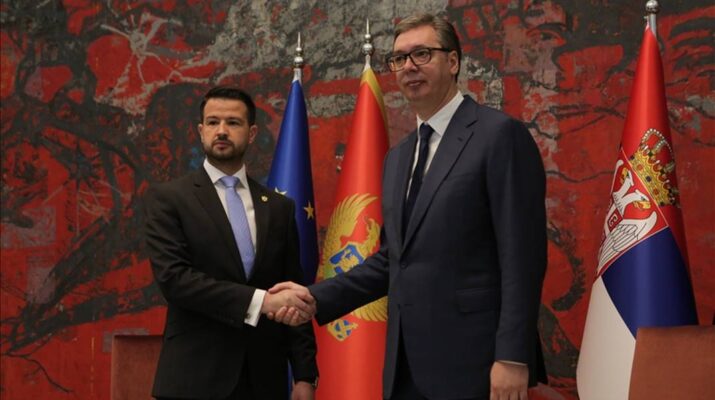With brutal attacks on free media, the truly civil sector, and independent intellectuals – Montenegro, primarily through the behavior…

Andrija Mandić will not stop at scandalous visits to Belgrade (“without a tie”!) and pacts with Vučić and Russian-Serbian political and security addresses. Ideas about “amendments” to the Constitution are already there, and the list, full of shortcomings, non-transparent, and extremely suspicious details, is just a platform for new political diversions that should first call into question, and then remove the constitutional restraints that protect civil and democratic the structure and logic of the Montenegrin state union.
With brutal attacks on free media, the truly civil sector and independent intellectuals – Montenegro, primarily through the behavior, style, rhetoric, and reasoning of the August authorities – is increasingly reminiscent of Serbia.
The coincidence of the statements of Alexander Bocan-Harchenko, the Russian ambassador in Belgrade, and his American colleague Christopher Hill regarding the painful situation after the extraordinary parliamentary, provincial, and local elections in Serbia surprised few.
Russian-American “illogicalities” regarding Serbia have been going on for several years. Both sides, in different ways, are fighting for primacy in influencing official Belgrade. Both hope that their methods of influence will outweigh the other’s efforts. The competition to woo Vučić continues.
Therefore, the condemnations of the “violent actions” of the opposition – which, with rhetorical nuances and different intonation, were uttered by both diplomats these days in the capital of Serbia – strangely remind us of the coincidence in support, i.e. in a positive attitude towards the initiative on the so-called Open Balkans, which, together with the entire spectrum of nationalist parties and politicians – who are not at all hostile to the idea of a “Serbian world” – from Belgrade, through Banjaluka, to Podgorica, and with the support and regional leadership ambitions of Albanian Prime Minister Edi Rama, supported, quite clearly – and on several occasions – both the State Department and the Kremlin! Such “strange coincidences”, when it comes to Serbia, will not end so soon. The fiasco of the “Open Balkans” platform did not disturb that (il)logical Russian-American “balance” in Serbia.
(For the sake of truth, the State Department corrected its first official reaction regarding the events in Serbia during and after the elections. Thus, “The authorities in Serbia should investigate the allegations of the OSCE about the elections, violence is unacceptable” – Voice of America in the Serbian language, a publication from December 25 – it became, that same day – “The authorities in Serbia to investigate the allegations of the OSCE about the elections”.
Ambassador Hill’s rhetoric was thus, at least in that detail, corrected, that is, pushed aside. As for the American diplomat, whose mandate in Belgrade gets controversial contents, it did not prevent him from continuing with expressions of public support for Vučić, which are becoming irritating for the State Department itself, and not only for Vučić’s opponents – both in Serbia and abroad)
CONSEQUENCES
“Serbian” details in Russian and American foreign policy in the Western Balkans cannot be limited to Serbia’s borders – the real and valid ones (and, in truth, unrecognized in Serbia itself, in the five EU countries, as well as in Russia) – but have their inevitable and very destructive consequences for the entire region of the Western Balkans.
Ambiguities and illogicalities about the regime in Belgrade – whichever side they come from (we haven’t forgotten the EU, of course) – have a very negative and destructive impact on Serbia’s environment. Bosnia and Herzegovina, Montenegro, and Kosovo are paying a high price for such a situation. The key is in the fact that Serbia is perceived as the central country (problem, situation, interest) of the region.
The “complementarity” of the American position – which became very clear during the Trump administration – with the subversive influence of Russia, whose penetration and multidimensional negative influence is gaining momentum, especially since 2016, is complemented by the inert and ineffective policy of the European Union towards the Western Balkans six. Although certain developments cannot be denied, it is clear that the European agenda in the Western Balkans is experiencing years of stagnation.
The momentum, it seems, was lost at the moment when the synergy of American and European efforts to bring the countries of the region closer to the European and Euro-Atlantic integration systems was lost. There is no agreement between the EU and the USA, although it would be difficult to find a single diplomat, from either side, to indicate this publicly, even indirectly. (Some sparks, it is true, also appeared in our country, when there was a clear confrontation of the insistence on the “Open Balkans” about the programs and projects of the Berlin Process).
The indicators of this stagnation are most visible in the three mentioned countries – which share the satisfaction of the fact that they are Serbia’s neighbors – which, “with a little help from Western friends”, even if that “help” was unintentional, i.e. with a completely different motivation compared to the consequences – they face long-term serious crises and burdensome political and security challenges and risks.
BIH, KOSOVO, AND MONTENEGRO – THREE NAMES OF THE SAME CRISIS
Bosnia and Herzegovina is, by all accounts, the most threatened. Her integrity is under constant examination, and her internal stability is in a state of permanent danger. The influence of Serbia/Russia is hyper-destructive (because the activities of Dodik should not be seen as some kind of autonomous phenomenon, since it simply is not, nor can it be).
Dodik’s latest announcements about the “declaration of independence” if the high representative Šmit (whose attitudes and actions cause great doubts about the true goals of the part of the international community that he represents) makes a decision regarding the state property of BiH that would not correspond to the current Banja Luka.
The shortest expression of this painful situation, in which, with its aspirations, Croatia also joined, would be: The Dayton Agreement represents a barrier to any progress in Bosnia and Herzegovina, but there is no readiness or interest of the international community to deal with this problem.
That bad momentum again. Things are not better even with the complex relationship between the Republic of Serbia and the Republic of Kosovo. Vučić’s latest “intermediate move” – the recognition of Kosovo’s license plates, which many interpret as his desire to ease the pressure of international factors (primarily Brussels, but also, as time goes by, Washington) is, in fact, a belated commitment which, as Kosovo Prime Minister Aljbin Kurti readily stated that, it could have ended two years ago. The real counterweight at the other end of the scale for Vučić is the terrorist action in Banjska, with which he seriously compromised himself – even though there are no visible sanctions from either Brussels or Washington, due to that extremely dangerous attempt.
The Serbian issue of Kosovo, seen from the perspective of current Serbian politics – both ruling and opposition – could be said to be in a hopeless situation for years. A dead end street that is too long and whose length is also affected by the unison of political forces in Belgrade – with marginal exceptions who, like “Serbia in the West”, live in a political ghetto and who, this time, are not allowed to cross the threshold of one percent of voters. Permanent tensions on the southern border of Serbia are what Moscow is looking forward to the most.
The problem is that, on the other hand, not only the controversial American ambassadors Grenell and Montgomery appear but also the current, often-mentioned Hill. (Hill’s colleague in Pristina, Ambassador Hovenier, just like their colleague in Podgorica, Ambassador Rajing Rajnka, are almost “junior partners” about the “headquarters” in Belgrade. Such is the structure and logic of the American diplomatic network in our part of the Balkans – sorry – does not bring good results)
Even if we wanted to, we cannot exempt Montenegro from this burdensome reality. On the contrary, in the last three years, it has slipped – many would say: it has been pushed – into a crisis, which, unfortunately, has no end in sight.
MONTENEGRO UNKNOWN
The new government of the economically ambitious and politically obviously insufficiently prepared Milojko Spajić has a lot of internal problems, the threads of which, quite unsurprisingly, also lead to Belgrade and further to the East.
The inclusion of ex-Democratic Front parties in the ruling coalition has already produced bad situations and new challenges/risks. Appeals from the Western parties not to do this were in vain – Spajić did not have the strength to resist the request of his own vice-president Milatović, supported by the propaganda machinery – visible and hidden – with known, mentioned principals.
Andrija Mandić will not stop at scandalous visits to Belgrade (“without a tie”!) and pacts with Vučić and Russian-Serbian political and security addresses. Ideas about “amendments” to the Constitution are already there, and the list, full of shortcomings, non-transparent, and extremely suspicious details, is only a platform for new political diversions that should first call into question, and then remove the constitutional restraints that protect civil and democratic the structure and logic of the Montenegrin state union.
Along with the brutal attacks on the free media, the truly civil sector and independent intellectuals – Montenegro, primarily through the behavior, style, rhetoric, and reasoning of the August authorities – is increasingly reminiscent of Serbia.
And that statement looks more like a judgment, rather than an assessment of the situation. Many in the international community are aware of this, as are the communications with diplomatic and foreign addresses, and many in the international community – even in countries and diplomacy that do not stand out for their special interest in little Montenegro.
Whether this awareness of theirs will have an impact on their actions toward our country and our neighbors and friends in the Western Balkans – the year ahead will show.
Optimistic and encouraging messages, and even promises, that Montenegrin officials – not only according to their testimonies – receive in Brussels and many European addresses – near and far – sound nice, although we are not hearing them for the first time.
That’s why we didn’t call this text, with which we end our “diplomatic mail” in the gloomy and dismal year 2023, a lament. Lament is possibly a “nicer” expression for the feeling caused by difficult problems and situations to which we are exposed. At least, if nothing else, it will be easier for our Western friends to understand…
(Pobjeda)
Napomena o autorskim pravima: Dozvoljeno preuzimanje sadržaja isključivo uz navođenje linka prema stranici našeg portala sa koje je sadržaj preuzet. Stavovi izraženi u ovom tekstu autorovi su i ne odražavaju nužno uredničku politiku The Balkantimes Press.
Copyright Notice: It is allowed to download the content only by providing a link to the page of our portal from which the content was downloaded. The views expressed in this text are those of the authors and do not necessarily reflect the editorial policies of The Balkantimes Press.

